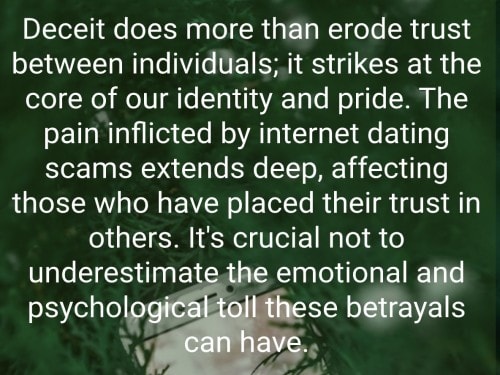Psychological Impact of Online Dating Scams

posted 16th February 2024

Psychological Impact of Online Dating Romance Scams
In the digital age, online dating has become a beacon of hope for those seeking love and companionship. However, lurking within these spaces are risks that go beyond the superficial disappointments of unmatched interests or ghosting. Online dating romance scams, a particularly insidious form of mass-marketing fraud, have devastating psychological effects on their victims. Unlike other fraud victims, those ensnared by romance scams suffer a 'double hit': the financial loss and the dissolution of a seemingly meaningful relationship. This article delves into the psychological aftermath of such scams, highlighting real-life examples and quotes from victims to underscore the profound impact on mental health.
The Loss of the Relationship: A Psychological Death
For many victims, the emotional and psychological toll overshadows the financial damage. The revelation that the relationship, often a source of profound emotional investment and connection, was a facade, equates to a significant bereavement. "It felt like a death," one victim shared, articulating the depth of the emotional void left by the scam. This sentiment is echoed widely among victims, for whom the loss of the relationship signifies not just the end of a romantic bond but the shattering of trust and a profound betrayal of emotions.
Trauma and Negative Psychological Effects
The trauma experienced by victims of online dating scams is multifaceted. "I couldn't trust anyone after that, not even myself," another victim confessed, highlighting the erosion of self-esteem and trust that often accompanies the realization of the scam. The psychological impact is profound, with many victims reporting symptoms akin to post-traumatic stress disorder (PTSD), including flashbacks, severe anxiety, and depression. The scam becomes a pivotal, traumatic event, disrupting their sense of safety and affecting their ability to form future relationships.
Lack of Support and Understanding
A significant challenge facing victims is the lack of understanding and support from family and friends. The unique nature of these scams often leads to a dismissive or judgmental reaction from others, exacerbating the victim's sense of isolation and shame. "My family just couldn't understand why I fell for it. They thought I was just naive," a victim lamented. This lack of empathy and support leaves many victims to navigate their recovery journey alone, struggling to find effective coping mechanisms.
Ineffective Coping Mechanisms: Denial and Vulnerability
Denial is a common but ineffective coping strategy employed by victims. Some refuse to accept the reality of the scam, clinging to the illusion of the relationship. Others struggle to dissociate the person they believed they were in love with from the criminal behind the scam. This denial not only impedes the healing process but also leaves victims vulnerable to further exploitation. "I still wanted to believe he was real, that we had something special. That denial almost made me fall for a second wave of the scam," a victim recounted.
Moving Forward: The Need for Understanding and Effective Coping Strategies
The journey toward healing and recovery for victims of online dating romance scams requires a compassionate understanding of the 'double hit' they have experienced. Mental health professionals play a crucial role in providing the necessary support, validation, and therapeutic interventions to help victims navigate their complex feelings of grief, betrayal, and trauma. Encouraging healthy coping mechanisms, such as seeking support from therapy groups or engaging in mindfulness and self-compassion practices, can aid in the recovery process.
Moreover, raising awareness about the psychological impact of these scams is essential. By educating the public and fostering a more empathetic response from family and friends, victims can feel less isolated and more supported in their recovery journey.
Psychologists play a pivotal role in assisting victims of online dating romance scams to navigate the complex emotional aftermath of their experiences. Their expertise can provide a supportive framework for healing and recovery, addressing the unique challenges these victims face. Here’s how psychologists can help:
Providing a Safe Space for Emotional Processing
Victims often grapple with feelings of shame, guilt, and betrayal, which may deter them from sharing their experiences with family and friends. Psychologists can offer a non-judgmental, confidential environment where victims feel safe to express and process these complex emotions. This safe space is crucial for victims to start their journey towards healing.
Validating the Victim's Feelings
Validation of the victim's feelings and experiences is a critical step in the healing process. Psychologists can affirm the victim's emotions, helping them understand that their reactions are normal responses to an abnormal and traumatic situation. This validation can alleviate feelings of isolation and self-blame.
Addressing Trauma and PTSD Symptoms
Many victims exhibit symptoms akin to post-traumatic stress disorder (PTSD), including flashbacks, anxiety, and depression. Psychologists can employ trauma-informed therapeutic approaches, such as Cognitive Behavioral Therapy (CBT) or Eye Movement Desensitisation and Reprocessing (EMDR), to help victims manage and mitigate these symptoms.
Rebuilding Trust and Self-esteem
The betrayal inherent in romance scams can severely impact a victim's ability to trust others and themselves. Psychologists can work with victims to rebuild their self-esteem and develop healthier relationship patterns. Techniques may include exercises in self-compassion, establishing boundaries, and gradually increasing social interactions to rebuild trust cautiously.
Developing Effective Coping Strategies
Psychologists can assist victims in identifying and developing effective coping strategies beyond denial. Coping strategies might include mindfulness practices, engaging in supportive group therapy, or finding healthy outlets for the emotional turmoil, such as creative expression or physical activity.
Educating About Scams to Prevent Re-victimisation
Part of the therapeutic process can also involve educating victims about the nature of scams and the psychology behind them. Understanding how and why they became victims can demystify the experience and reduce self-blame, as well as arm them with knowledge to prevent future victimisation.
Supporting Through the Grieving Process
The loss of the relationship, even though it was fraudulent, necessitates a grieving process similar to any significant loss. Psychologists can support victims through the stages of grief, helping them come to terms with the loss and move forward with their lives.
Enhancing Social Support Networks
Psychologists can encourage victims to broaden their support networks, whether through reconnecting with family and friends, joining support groups specifically for scam victims, or engaging in new social activities. Expanding these networks can reduce feelings of loneliness and isolation.
In conclusion, psychologists are instrumental in addressing the 'double hit' victims of online dating scams experience. Through targeted therapeutic interventions, emotional support, and practical guidance, they can aid victims in navigating the complex process of recovery, helping them to heal and eventually thrive beyond the scam.



